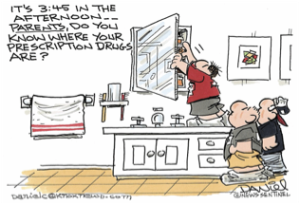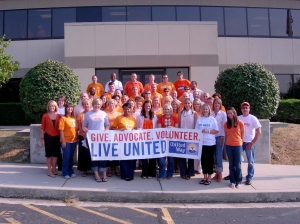We often hear the term identity theft on the news or when salesmen call to offer us credit protection services. But what exactly is identity theft and what do we need to know to protect it? Identity theft occurs when someone uses your personal information such as name, credit card, or social security number without permission to commit fraud or other crimes. The Federal Trade Commission estimates that 9 million Americans are identity theft victims each year. Identity theft can damage your credit report, which can result in lost job opportunities or the inability to access credit for purchases such as a home or car.
Identity thieves can get new credit cards, use credit limits on existing credit cards, rent an apartment, or even pay utility deposits using your information. Identity theft can also be as simple as an unexplained charge on your credit card statement or a debit from your checking account that you don’t recall making or have a receipt for. Many victims of identity theft don’t recognize small transactions as symptoms of a larger problem. In fact, many victims do not realize their identity has been stolen until months, or even years after the theft. And once identified, consumers will invest time and money to restore their good name. The average out-of-pocket expense for consumers facing identity fraud was $631 per incident in 2010, up from $387 the prior year.
Many of us think of high tech hacking when we think of identity theft. While tossing a credit card offer, using an ATM machine, or posting a status update on your Facebook page may all seem like ordinary tasks, to an identity thief these are opportunities to steal your information and use it for their own benefit. In fact, identity thieves regularly use methods such as going through your trash or mailbox to obtain your information. Another sad truth is that having your identity stolen by friends and family is quite common.
We are all vulnerable to identity theft. Protecting oneself requires consumers to use caution when conducting everyday business and take swift action if they think their information has been compromised. CredAbility suggests consumers take these steps to help safeguard their identity:
Protect your Personal Information
- When conducting business online or over the phone, never share personal or financial information unless you have initiated contact and know who you are talking to.
- Empty your wallet—take out credit cards that you don’t use regularly, Social Security cards or other cards that may contain your Social Security number, such as insurance cards. Once you minimize what you’re keeping in your wallet, photocopy both sides of everything and keep in a secure location for easy access in case your wallet is lost or stolen.
- Checks – if possible, use a P.O. Box instead of your home address on checks. Never print your Social Security Number on checks. When you order checks or a new driver’s license, have them sent to the bank instead of your home.
Think Before You Post
A recent survey by Consumer Reports revealed that more than half of adult users of social networks such as Facebook and MySpace have posted risky personal information online.
- Check your online Social Networking Account privacy settings and limit what you share with others. Remove personal contact information, birth date, city of residence, and any other personal information from public view and consider removing it altogether.
- Do not post vacation plans, or even plans for the day—these posts can alert a potential identity thief to when you will be gone and for how long. If you want to share, wait until after you have returned.
- Monitor your kids’ activity. If you allow your children to be part of any social network, be sure that they are following these same guidelines.
Use Caution when Sending or Tossing Mail
- Raising the flag on your mailbox signals identity thieves that there might be information to steal in the box. Checks provide thieves with your name, address and bank account information. Drop outgoing mail into a U.S. Mailbox or at the Post Office.
- Shred everything, including unsolicited applications for credit cards and other loan products, and credit card receipts. If it has your personal information on it, it is always better to shred it before throwing it away.
Practice Internet Safety
- Do not click on links in emails that ask you to “verify” personal information or passwords, even if they appear to be from your financial institution.
- Do not save user names and passwords on your computer. Instead, enter them each time you access a site. Change passwords periodically and use strong passwords, such as those with a random combination of letters, numbers and characters) to minimize easy detection. Refrain from using birthdates, anniversaries and other easy to find numbers.
- When shopping online, do not use debit cards or checks for purchases. Use credit cards, and be sure to look for the small lock on the bottom right hand corner of the screen or look at the url on your internet browser to ensure it begins with HTTPS// – these indicators reflect the purchase is being made over a secure server and that your information is encrypted to protect it.
- Keep your virus protection software up-to-date, use a secure server to access the internet, and install a firewall to prevent thieves from “logging in” to your computer.
Monitor your credit reports
Unfortunately, by the time most consumers become aware that someone has gained credit in their name, it is too late to prevent the theft. But you can minimize the damage by knowing what’s in your credit report and reviewing it regularly for changes.
Consumers can receive a free copy of their credit report every year. Request a copy of your report online at www.annualcreditreport.com, by calling (877) 322-8228, or by mailing a request form to Annual Credit Report Request Service, P.O. Box 105281, Atlanta, GA 30348-5281.
Even one unexplained transaction on your account could be a sign of identity theft. Quick action can minimize the impact and reduce the amount of time and money spent repairing the damage. If you are the victim of identity theft, take the following steps:
File a Police Report
File a report with your local police department and get a copy. You may need to submit this report to creditors and others to prove the theft.
Notify the Credit Bureaus
Contact the fraud departments of any of the three major credit bureaus to place a fraud alert on your credit file.
TransUnion: 1-800-680-7289; www.transunion.com; Fraud Victim Assistance Division,
P.O. Box 6790, Fullerton, CA 92834-6790
Equifax: 1-800-525-6285; www.equifax.com; P.O. Box 740256, Atlanta, GA 30374
Experian: 1-888-EXPERIAN (397-3742); www.experian.com; P.O. Box 9532, Allen, TX 75013
Once you call one credit bureau, they are required to notify the other two. Once you place the fraud alert on your file, you are entitled to a free copy of your credit report from each. Request that only the last 4 digits of your Social Security Number appear on the report. Review the reports carefully, looking for inquiries from companies you haven’t contacted, accounts you didn’t open, and debts on your accounts that you can’t explain.
Close the accounts that you know or believe have been tampered with or opened fraudulently
If you suspect that your accounts have been tampered with or see new accounts that may have been opened fraudulently, close them immediately. Call and speak with someone in the security or fraud department of each company. Be sure to document each conversation, including dates, times and who you talked to. Keep copies of all supporting documents and if you send correspondence, do so by certified mail, return receipt requested. Once you clear up your credit report, check them periodically to make sure no new activity has occurred.
When you open new accounts, use new passwords and personal identification numbers (PINs). Avoid easy to crack codes such as birth dates, phone numbers, your mother’s maiden name or your house number.
File a complaint with the Federal Trade Commission
By sharing your identity theft complaint with the FTC, you will provide important information that can help law enforcement officials across the nation track down identity thieves and stop them.
File a complaint with the FTC using the online complaint form, which can be downloaded at: https://www.ftccomplaintassistant.gov/; or through their toll free Identity Theft Hotline at 1-877-ID-THEFT (438-4338). Be sure to call the Hotline to update your complaint if you have any additional information or problems.
About CredAbility
CredAbility is one of the leading nonprofit credit counseling and education agencies in the United States, serving clients in all 50 states plus the District of Columbia, Guam, Puerto Rico and the US Virgin Islands, in both English and Spanish. In addition, we provide in-person counseling through our branch network of more than 25 offices located across the southeast.
Founded in 1964, CredAbility is a family of Consumer Credit Counseling Service agencies that includes CCCS of Greater Atlanta, CCCS of Central Florida and the Florida Gulf Coast, CCCS of Palm Beach County and the Treasure Coast, CCCS of East Tennessee, CCCS of Central Mississippi and CCCS of Upstate South Carolina.
The nonprofit agency is accredited by the Council on Accreditation and is a member of the Better Business Bureau and the National Foundation for Credit Counseling (NFCC). Governed by a community-based board of directors, CredAbility is funded by creditors, clients, individual donors and grants from foundations, businesses and government agencies. Service is provided 24/7 by phone at 800.251.2227 and online at www.CredAbility.org
LOCAL CONTACT:
(865) 329-8001 (office) / Daru.Burdge@CredAbility.org
 Overdose fatalities have increased threefold since 1990. It is now the second leading cause of accidental death in America, just behind motor vehicle crashes. Prescription drugs have significantly contributed to this trend, and East Tennessee has been particularly impacted. Statistics show the Appalachian region has one of the highest overdose rates in the entire nation.
Overdose fatalities have increased threefold since 1990. It is now the second leading cause of accidental death in America, just behind motor vehicle crashes. Prescription drugs have significantly contributed to this trend, and East Tennessee has been particularly impacted. Statistics show the Appalachian region has one of the highest overdose rates in the entire nation.



 Posted by unitedwayknox
Posted by unitedwayknox 

